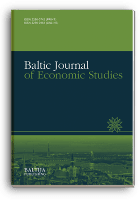
Baltic Journal of Economic Studies
Scope & Guideline
Advancing Economic Knowledge in the Baltic Region
Introduction
Aims and Scopes
- Economic Sustainability and Competitiveness:
Research exploring strategies for enhancing the sustainability and competitiveness of enterprises, particularly in agriculture and local governance. - Digital Transformation and Innovation:
Focus on the impact of digital technologies and innovation on various sectors, including education, healthcare, and public administration. - Public Finance and Economic Policy:
Studies examining the role of public finance, including taxation and public spending, in fostering economic stability and growth. - Legal and Institutional Frameworks:
Analysis of the legal and institutional aspects that influence economic activities, including anti-corruption measures and regulatory frameworks. - Socio-Economic Development:
Research addressing socio-economic issues, including labor market dynamics, social welfare, and community development. - Impact of Crises on Economic Systems:
Exploration of how crises, such as military conflicts and pandemics, affect economic systems and recovery strategies.
Trending and Emerging
- Digital Economy and Innovation:
A significant trend in recent publications is the exploration of digital economy concepts, including digital entrepreneurship and the impact of technology on business practices. - Sustainability and Green Economy:
There is a growing emphasis on sustainability, with research focusing on green economy initiatives and their implications for development in various sectors. - Impact of Global Crises:
Studies exploring the economic impacts of global crises, such as the COVID-19 pandemic and geopolitical conflicts, are increasingly prevalent, reflecting the need for adaptive economic strategies. - Public-Private Partnerships:
Research on public-private partnerships has gained traction, examining how these collaborations can drive economic recovery and development. - Social Responsibility and Inclusive Growth:
Emerging themes related to corporate social responsibility and inclusive growth strategies are becoming more prominent, emphasizing the role of businesses in societal development.
Declining or Waning
- Traditional Economic Theories:
There is a noticeable decline in research focused on classical economic theories, as contemporary discussions shift towards more innovative and adaptive economic models. - Sector-Specific Studies:
Research focusing narrowly on specific sectors without integration into broader economic frameworks is decreasing, indicating a move towards more interdisciplinary approaches. - Historical Economic Analysis:
Papers that analyze historical economic trends in isolation are becoming less common, as the journal emphasizes current and practical applications of economic research. - Non-Digital Business Strategies:
Research related to non-digital business strategies is waning as the focus shifts towards digitalization and the integration of technology in business practices.
Similar Journals

African Review of Economics and Finance-AREF
Empowering Financial Discourse in the African ContextAfrican Review of Economics and Finance (AREF) is a distinguished academic journal dedicated to advancing knowledge in the fields of economics and finance within the African context. Published by PORTHOLOGOS PRESS, the journal aims to provide a platform for research that addresses critical economic and financial issues that affect Africa, promoting innovative solutions and fostering discussion among scholars and practitioners. With its ISSN 2042-1478 and E-ISSN 2410-4906, AREF has established itself as a vital resource for researchers, professionals, and students seeking to deepen their understanding of African economies. The journal’s commitment to open access ensures that its valuable research findings are readily available to a global audience, thereby enhancing visibility and engagement. Through rigorous peer-review processes and thoughtful editorial leadership, AREF contributes significantly to the discourse on economic development, policy analysis, and financial practices in the region.
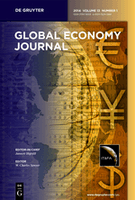
Global Economy Journal
Navigating the complexities of the global economic landscape.Global Economy Journal, published by World Scientific Publishing Co Pte Ltd, is an authoritative platform dedicated to advancing research in the fields of economics, econometrics, and finance. Established in 2006 and operating from Singapore, this journal aspires to address comprehensive topics that shape both global and local economic landscapes, making significant contributions to academic discourse and policy-making. With an ISSN of 2194-5659 and an E-ISSN of 1553-5304, the journal is recognized for its rigorous peer-review process and is currently ranked in the Q3 quartile of economics journals as of 2023, placing it within the top half of scholarly publications in the field. The Scopus ranking positions it at #132 out of 288, showcasing its growing influence among researchers and professionals alike, embodying a percentile of 54. Although it does not offer open access, the journal plays a pivotal role in disseminating cutting-edge research, fostering a profound understanding of economic trends, challenges, and innovations that impact societies worldwide. Researchers, professionals, and students are encouraged to engage with the latest findings and discussions published in the Global Economy Journal to stay at the forefront of economic thought and practice.

Baltic Journal of Economics
Connecting researchers to a world of economic knowledge.Baltic Journal of Economics, published by Routledge Journals, Taylor & Francis Ltd, is a distinguished platform for research in the fields of economics, political science, and international relations. With an ISSN of 1406-099X and an E-ISSN of 2334-4385, this Open Access journal has been committed to disseminating valuable research since 2014, providing scholars with unrestricted access to impactful studies. As a testament to its quality, the journal resides in the Q2 category within Economics and Political Science as of 2023, ranking highly in Scopus with a notable percentile in its respective fields. By bridging theoretical frameworks with practical implications, the *Baltic Journal of Economics* aims to foster a deeper understanding of contemporary economic and political challenges, making it an essential resource for researchers, professionals, and students dedicated to exploring these dynamic disciplines. With a publication timeline extending from 2008 to 2024, it welcomes diverse studies that contribute to the ongoing discourse in the social sciences, supporting the evolution of knowledge in a globalized context.
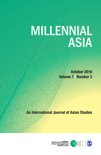
Millennial Asia
Fostering Critical Analyses of Contemporary Asian IssuesMillennial Asia is a premier academic journal published by SAGE Publications Inc that serves as a vital platform for interdisciplinary research in the vibrant fields of cultural studies, development, economics, political science, and sociology. With its ISSN 0976-3996 and E-ISSN 2321-7081, the journal provides a comprehensive examination of the socio-economic and political landscapes of Asia, fostering dialogue between regional experts and global scholars. Since its inception in 2014, it has established itself as a significant voice in the academic community, achieving a remarkable quartile ranking of Q1 in Cultural Studies and multiple Q2 rankings in Development, Economics, and Political Science disciplines for 2023. The journal's Scopus rankings further underscore its impact, with notable percentiles in various categories, indicating its commitment to high-quality research. Despite being a non-open access journal, it provides targeted insights and critical analyses that are indispensable for researchers, professionals, and students interested in understanding the complexities of contemporary Asian societies. As it converges towards 2024, Millennial Asia continues to expand its reach and relevance in the rapidly evolving academic landscape.
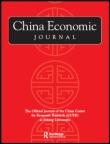
China Economic Journal
Pioneering Research at the Crossroads of Economy and CultureChina Economic Journal, published by Routledge Journals, Taylor & Francis Ltd, serves as a premier platform for scholarly discourse in the fields of Cultural Studies, Economics, and Sociology, with a notable impact factor reflecting its esteemed reputation. Since its inception in 2010, the journal has dedicated itself to advancing knowledge and understanding of the dynamic economic landscape of China, addressing critical issues that intersect with culture, policy, and society. With a strong quarterly ranking in prestigious categories — Q1 status in both Cultural Studies and Economics, as well as a reputable position in Sociology and Political Science — it stands among the top-tier journals globally. Researchers, professionals, and students alike benefit from its rigorous peer-reviewed articles that contribute significantly to both academic and practical insights. Although the journal is not open access, it remains a vital resource for those seeking to engage with contemporary discourse on China's economic trajectory and its implications in the global context.
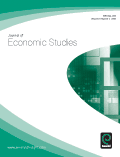
JOURNAL OF ECONOMIC STUDIES
Pioneering Perspectives in Finance and EconometricsJOURNAL OF ECONOMIC STUDIES, published by Emerald Group Publishing Ltd, stands as a pivotal platform in the field of economics, econometrics, and finance since its inception in 1974. With an impressive Scopus rank of 54 out of 288, placing it in the 81st percentile, this journal is recognized for its rigorous peer-review process and high-quality research contributions. Operating with a Q2 category ranking in the 2023 evaluation, it provides a rich repository of scholarly articles aimed at advancing the understanding of economic theories and practices. The journal embraces a wide scope, encompassing various dimensions of economic studies and offering insights crucial for both academics and practitioners. Although it is not an open-access journal, it remains highly regarded for its comprehensive analyses and innovative approaches in the field, making it an essential read for researchers, professionals, and students alike seeking to stay abreast of current economic trends and data-driven research."
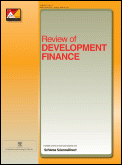
Review of Development Finance
Advancing Knowledge for Economic EmpowermentReview of Development Finance is a peer-reviewed academic journal dedicated to the exploration and promotion of innovative research in the fields of development finance, economics, and econometrics. Published by AFRICAGROWTH INST in South Africa, this journal serves as a vital platform for scholars and practitioners to share their insights on the financial mechanisms that drive development, particularly in emerging economies. Despite its current impact factor reflecting its nascent status within the lower quartiles (Q4) of its categories, Review of Development Finance aspires to contribute to the understanding and progression of finance as a tool for accelerating development from 2011 to 2024 and beyond. It encourages submissions that challenge conventional wisdom and provide empirical evidence supporting the role of finance in attaining sustainable growth. By fostering an open exchange of ideas amongst researchers, professionals, and students, this journal aims to enhance the discourse surrounding development finance and inspire impactful solutions to global economic challenges.
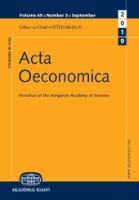
ACTA OECONOMICA
Bridging theory and practice in economic scholarship.ACTA OECONOMICA is a distinguished academic journal published by AKADEMIAI KIADO ZRT, focusing on the fields of Economics and Econometrics. With an ISSN of 0001-6373 and an E-ISSN of 1588-2659, this journal has been a crucial platform for scholarly discourse since its inception, providing valuable insights to researchers, professionals, and students. Although it is categorized in the Q4 quartile for Economics and Econometrics as per the 2023 rankings, it serves as an important resource for emerging and established scholars alike, contributing to the ongoing dialogue within the economics community. The journal has a notable history of convergence from the years 1995 to 2000 and 2002 to 2024, reflecting its commitment to fostering academic excellence and promoting innovative research methodologies. While currently lacking open access options, ACTA OECONOMICA offers a wealth of research articles and discussions, making it an essential reference for those seeking to deepen their understanding of economic theories and applications.
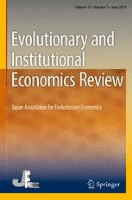
Evolutionary and Institutional Economics Review
Innovating Perspectives on Economic Systems and WelfareThe Evolutionary and Institutional Economics Review, published by SPRINGER HEIDELBERG, serves as a pivotal platform for disseminating cutting-edge research in the dynamic fields of evolutionary and institutional economics. With its ISSN 1349-4961 and E-ISSN 2188-2096, this journal emphasizes interdisciplinary approaches that explore how economic institutions evolve and impact economic performance and social welfare. Although currently not open access, it provides invaluable insights for researchers, professionals, and students keen on understanding the intricate relationships between economic systems and institutional frameworks. The journal aims to foster academic discourse that bridges theoretical perspectives and practical implications, enhancing the scholarly conversation within the economic community. Its headquarters in Heidelberg, Germany, positions it at the heart of European economic research, making it an essential resource for anyone interested in the evolution of economic thought.

Prague Economic Papers
Exploring Innovative Research in Economic DisciplinesPrague Economic Papers is an esteemed scholarly journal dedicated to the fields of Economics, Finance, and Econometrics, published by UNIV ECONOMICS-PRAGUE. With its ISSN 1210-0455 and E-ISSN 2336-730X, this journal serves as a vital platform for innovative economic research and theoretical advancement. Operating from the scenic backdrop of the Czech Republic, Prague Economic Papers is recognized in Scopus with rankings that place it in quartile Q4 for Economics and Econometrics, as well as Q3 for Finance, reflecting its growing impact in the academic sphere. Though the journal does not currently offer open access, it ambitiously covers a wide expanse of economic theories and empirical studies, contributing significantly to the evolution of economic thought from 2008 to 2024. Researchers, professionals, and students alike will find this journal essential for accessing critical insights and methodologies that shape contemporary economic discourse.